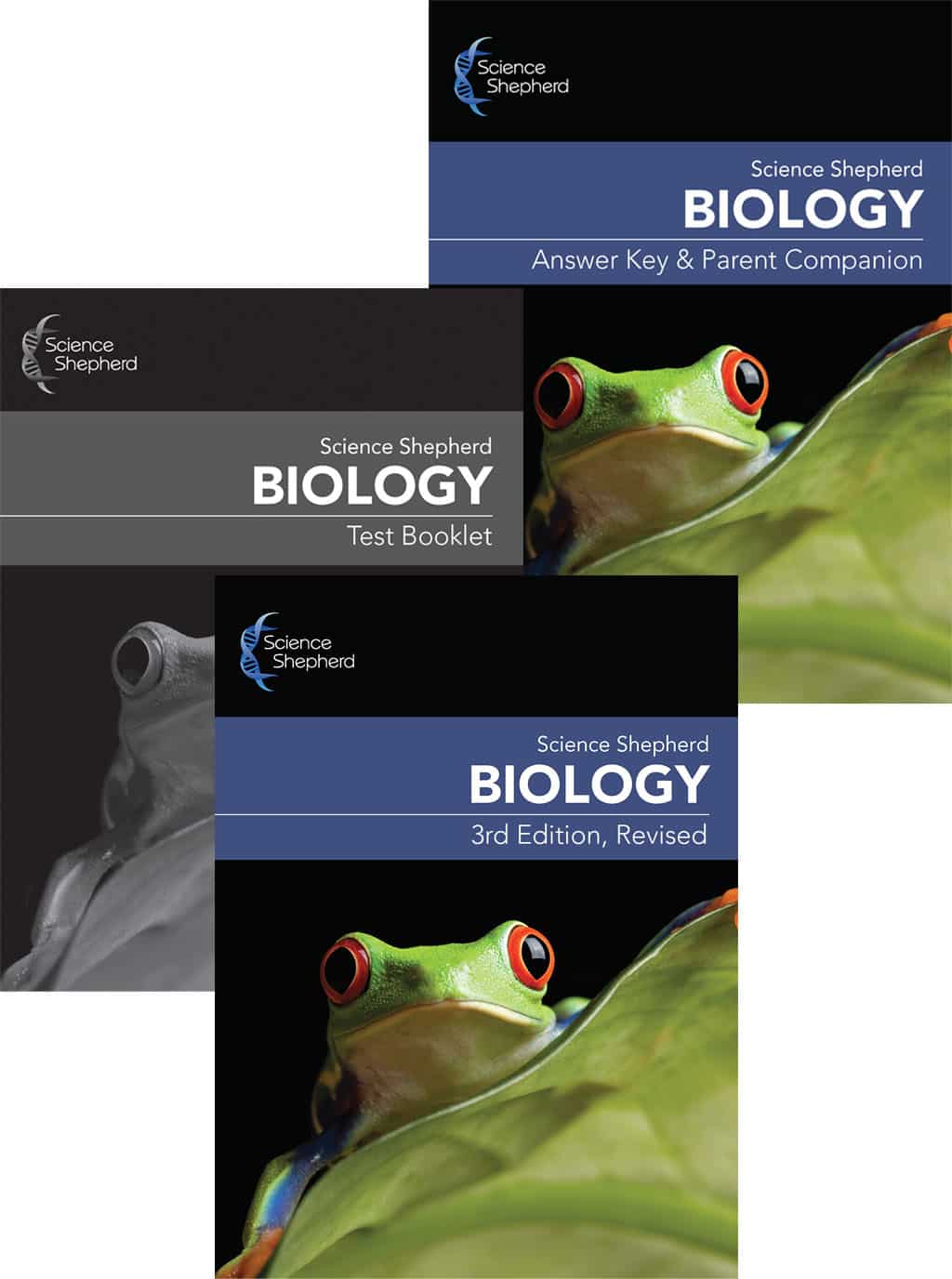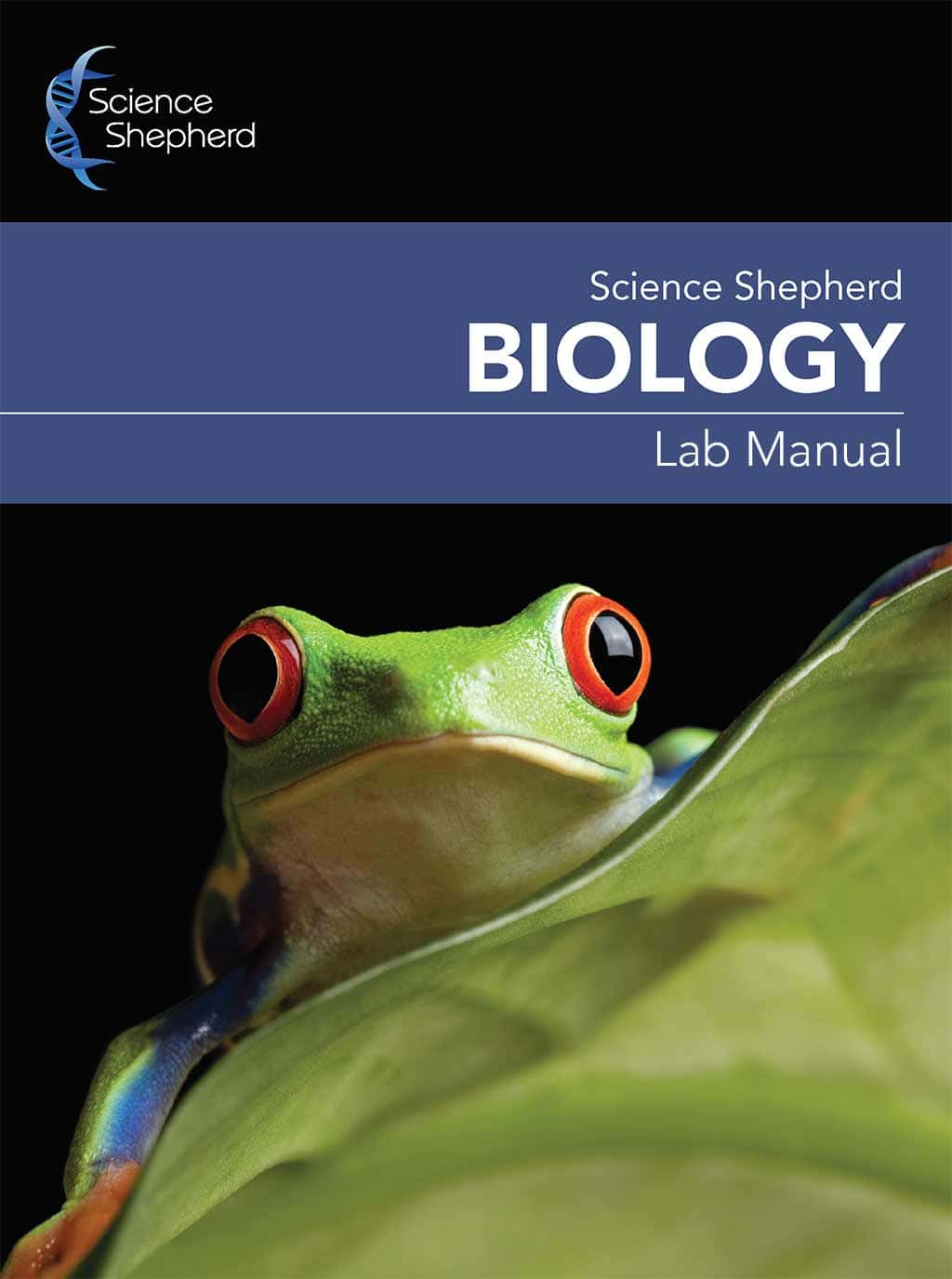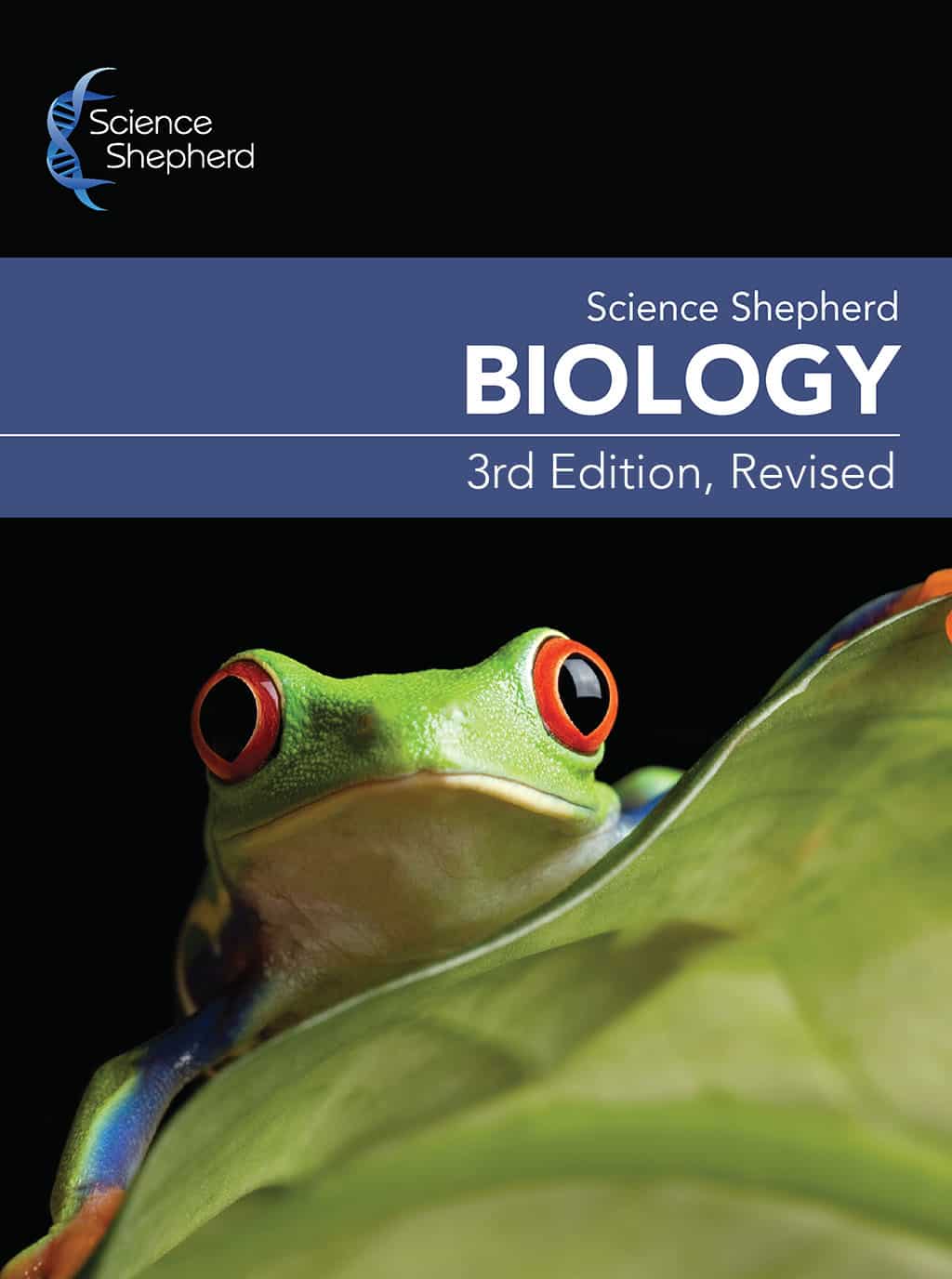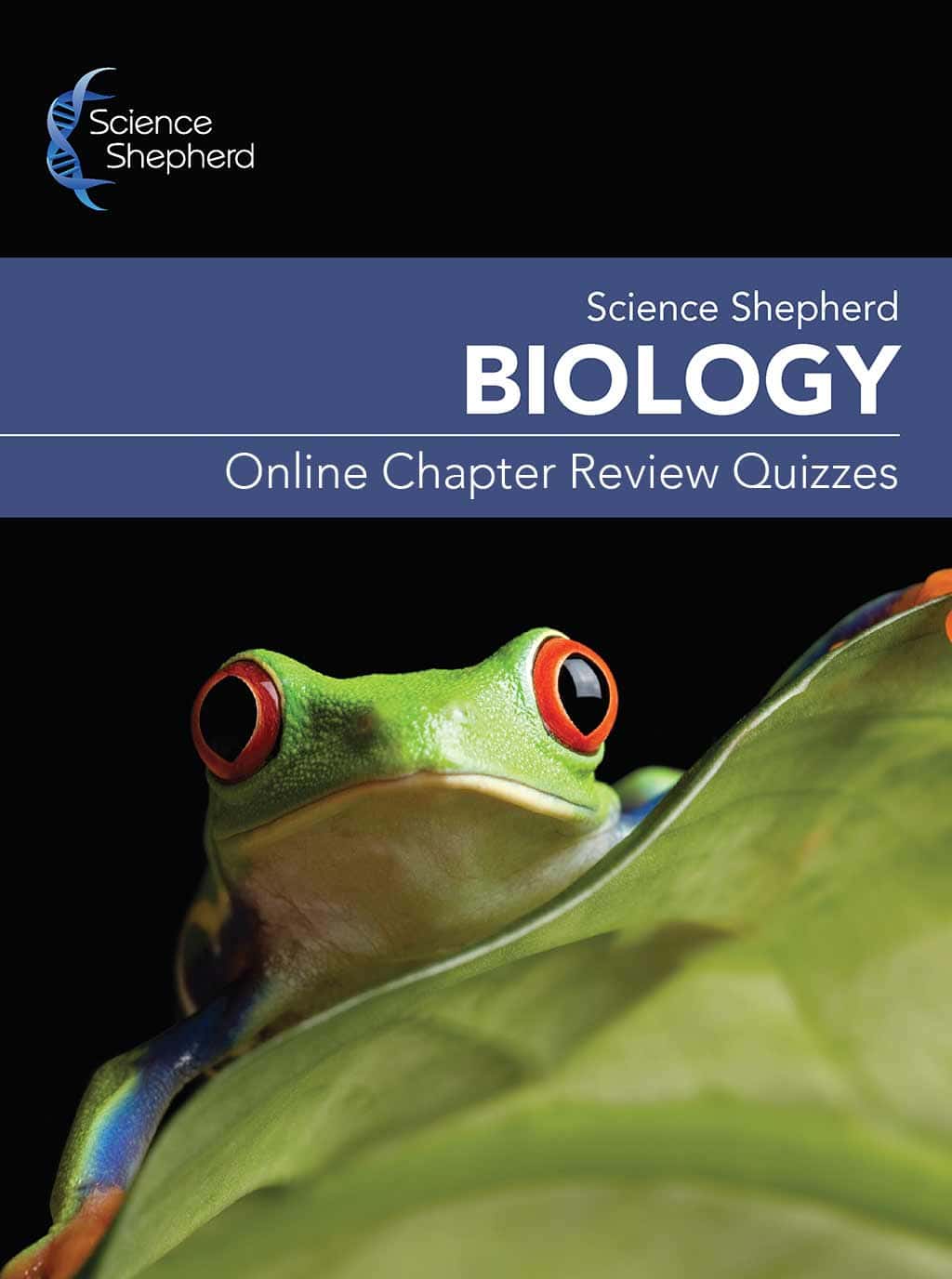

Homeschool Biology Curriculum
By Course
Additional Resources
What People Are Saying
-
My children are sad to be done with your Introductory Science course. So am I! It made science so easy this year!
Mrs. L.
It is absolutely no wonder to me that you received this award. I have found your high school biology amazing.
Sami W. and Children
Just wanted to drop a quick note and say how much we are enjoying the Life Science curriculum. Hands down, it is the best program out there.
Ellen K.
Recently Viewed

Key Features
- College-prep homeschool biology curriculum for high school.
- Encourages independent study.
- In-depth video lessons available.
- Full-color Textbook with chapter study questions.
- Answer Key & Parent Companion with chapter summaries and key teaching points.
- Test Booklet with 15 tests.
- Available Lab Videos, including dissections.
- Lab Manual with critical thinking questions.
- Recommended 36-week schedule provided.
- Available for homeschool co-ops and traditional schools.
- Fully developed by a homeschool family.
Biology Curriculum Overview
Science Shepherd Biology is a comprehensive college-prep homeschool biology curriculum for high school, incorporating textbook, optional video lessons, labs, supplementary parent/teacher guidebook, and tests. Written by physician and homeschool dad Scott Hardin, MD, Science Shepherd Biology is written from a biblical worldview and is designed for independent study with an easy-to-learn presentation of advanced concepts.
In the Biology Textbook, scientific concepts are presented in a clear, straightforward manner without distracting sidebars. Key areas discussed include the structure and function of cells, genetics and inheritance, animal classification, human anatomy & physiology and more. Special attention is also given to creation and evolution to show that observed science supports biblical creation. The Biology Test Booklet contains 15 tests for thorough review of course concepts, and the Biology Answer Key & Parent Companion helps homeschool parents support their student's learning without needing a background in science themselves.
The available Biology Video Course (streaming or DVD) offers over 42 hours of comprehensive teaching. In each lesson, Dr. Hardin presents an in-depth section-by-section review of the Biology Textbook, 3rd Edition (also compatible with the 3rd Edition, Revised Textbook), with additional supportive material to help students fully understand the subject.
- Biology Video Course: 133 lessons plus labs, 42+ hours, ~18 minute average lesson time.
Plus, the Biology Lab Videos walk students through the process and expected results of 19 experiments, so they can be confident they are accurately performing each lab. The Biology Lab Videos are included with the full video course or are available as a separate purchase. They can be used alongside the Biology Textbook and Biology Lab Manual, or as a standalone homeschool lab credit without using the full Biology curriculum.
Age/Grade Recommendations
- Biology is a college-prep program recommended for high school grades 9-12, ages 14+.
Grade/age recommendations are flexible and meant only as guidelines. The free course preview and curriculum samples can help you determine if Biology is right for your students (see below).
Lab Supplies
Lab kits for our homeschool biology curriculum are available from Rainbow Resource Center at the links below, or you can use the Biology Lab supply list to create your own kit. Lab Kits do not include a Lab Manual, Lab Videos or microscope.
Complete Biology Lab Kit: Includes all of the lab supplies and dissection specimens. Ideal for those who are using our Biology labs for the first time and want to do all of the labs.
Biology Lab Kit: Includes all of the lab supplies EXCEPT for the dissection specimens. Ideal for those who are using our Biology labs for the first time and want to do the microscopy labs, but NOT the dissection labs.
Biology Dissection Specimens: Includes the five dissection specimens used in the lab portion of the Science Shepherd Biology course: freshwater clam, earthworm, grasshopper, perch and a double-injected fetal pig. Ideal for those who have previously used our Biology labs and still have the other supplies but need new dissection specimen.
We recommend the Model 3000F-LED Microscope, or one with similar specs/features.
Award-Winning Homeschool Biology Curriculum
Science Shepherd Biology was awarded the 2015 Practical Homeschooling Science Reader Award, is one of Cathy Duffy's 103 Top Picks for Homeschool Curriculum, and receives rave reviews from families. You can be confident that our homeschool Biology curriculum will provide an excellent educational experience to your student.




Biology Free Preview
Watch a sample lesson video below, or access a free preview of our homeschool Biology curriculum through our student learning portal. The preview includes 4 complete lessons, a corresponding section of the Biology Textbook, a full lab video, and a full chapter of online review questions.
Ready to dissect biology? Save up to 10% with a Biology homeschool curriculum bundle.
In this chapter, we will discuss the biological process of asexual cell division called mitosis, review the theory of spontaneous generation and how it was disproved, review the theory of biogenesis, investigate the process of DNA replication, learn how DNA is packaged in the cell at various stages, and discuss the events of the cell cycle. Now, before we do this, I want to take a look at the picture that we have on our chapter header here. And this is a picture from an onion cell. And the reason that I want to point this out to you is because I think this is really a cool picture and this is actually something that we're going to do in lab. If you got our lab program, you'll do this as well. But if you look at these pictures, there's a couple of pictures here that are really pretty cool. What you're seeing here are the onion cells and you can clearly see them. They're these nice rectangular cells. The dark thing in the middle is the nucleus. And if you look at a couple of these, particularly the one kind of right in the middle and then there's one that's two cells away from it and then to the top up towards the right and then there's one that's two cells, maybe one cell but kind of some distance because some of the cells here got damaged in the slide prep. But if you move over here, you can see some more cells. And what you're looking at here are these are chromosomes. And remember, we talked about the chromosomes being present during mitosis and what we're looking at are these very, very condensed forms of DNA called chromosomes. And if you look, you can see if you look at the dark little the dark little dots in the middle of them, you can see in this one right in the middle, they've all lined up in the middle of the cell. And this is what happens right before the cell splits apart. The chromosomes line up right along the middle here and get pulled apart. So this is kind of a preview of what we're going to do. But I wanted you to see really how easy it is with with the right staining and slide preparation technique to see chromosomes in a rapidly dividing cell, which the tip of an onion is because it grows very quickly. This chapter is going to serve as an introduction to cell division because there's actually several different types of cell division, but they all kind of do the same thing. And so the concepts are very similar and we'll use this as a foundation. The four different types of cell division are called mitosis, meiosis, binary fission and budding. And we'll talk a little bit about these as we go along this year, but we're going to spend most of our time on mitosis and meiosis. It's important to remember if we think just for a second, let's think about a single cell organism. We talked earlier in the year when that there is a property of life that all cells replicate themselves. And this is how single cell organisms make more of themselves. They have to in some way, if you have a single cell, that single cell has to do something in order to make more of itself. And what it does is it replicates itself, so it divides in half. And in order to make sure that each cell, so when you divide in half, remember the instructions that are that tell that cell how it's supposed to function and what kind of cell it's supposed to be for that single cell organism. So that DNA is contained in the DNA. So that DNA has to somehow get you need a full copy in the parent cell where the starting cell as well as a full copy in the daughter cell or else the cell won't work. So that's how this works. That's what we're talking about for single cell organisms is the process that ends up duplicating the DNA. So you need if you only have one copy, but you're going to make two cells. The first thing you need to do is duplicate the DNA. So you have two full copies and then you need to distribute it in each cell. So when the cells pull apart, each cell gets a copy of that DNA. And that's the same idea if you're talking about a multicellular organism, all multicellular organisms originally start out as a single cell. And the reason and the way that that single cell turns into a multicellular organism is that the cell the one cell divides into two and then the two into four and the four into eight, the eight into sixteen, etcetera, until you have, the multicellular organism, whether you're talking about a fish or or a human being. And so that process, every time a cell divides, it needs to make sure that a fully functional set of DNA gets from the parent cell into the daughter cell. So when that when that one cell splits in half and forms two, you've got a full copy of the DNA in each one of those cells. And that's what mitosis is all about. So that's what we're going to be learning about as we go along here.
Sample Lab Video: Fetal Pig Dissection
The fetal pig dissection sample does show a portion of the actual dissection. If you would like to continue, click here to watch the dissection sample.
Additional Information
-
The short answer is that the materials included with the video series can stand alone, but the optimal learning experience will not be attained without the textbook; however, there are nuances to that answer that deserve explaining. I have no doubt that if the video alone is utilized, your student will receive a most excellent learning experience, equal to/better than that of the other video-only based high school biology programs out there. The nuance in the answer is that it depends upon what you and your student’s goal is for learning biology. If the goal is to ensure a solid experience for someone who struggles with science and isn’t going to pursue too much further learning in the biological sciences, then the video only approach will absolutely achieve that goal. On the other hand, if the student is highly interested in biological science and/or wants to pursue it further after this class, then, while the video itself is “complete” in that all of the material in the text is presented in the video, the video alone will not provide adequate ability for the student or teacher to assess the completeness of understanding of the material. I think the ideal way to learn this material is to both read and hear it (students who are challenged with text-based learning often do quite well with the text after watching the information first presented visually), with the text ultimately serving as a ready reference should a question arise (in which case trying to find the relevant material on one of more than 130 video clips amassed over more than 40 hours of video will be quite challenging). In addition, the end of chapter questions in the book are designed to test complete mastery of the subject matter (and they are ideally set up for both text-based learners and auditory learners) since they are true-false and short answer questions. This is, by far, the most thorough way to assess your student’s understanding of the material (as opposed to multiple choice or fill in the blank). If the video series is used alone, this valuable knowledge testing resource will be lost. Now, it is true that I have developed multiple choice questions that are integrated into the video series and learning platform but, again, they are really designed as a supplement for, rather than a substitute of, the questions in the text itself.
-
The 3rd Edition, Revised of Biology includes almost exclusively updates to the graphics. There are a few minor rewrites for clarity, but otherwise the text remains unchanged from the 3rd Edition. The textbook is softcover, rather than hardcover.
-
This is a somewhat difficult question to answer with 100% accuracy since there is no specifically defined “AP®” or “CLEP®” approved program; rather, in the case of the AP® program, the company provides a syllabus around which a teacher designs their specific AP program. When I review that syllabus (many different AP syllabi are on the web and you will find them by searching “AP biology syllabus”, or the recommended AP® Biology content), I find that our program covers 100% of what the AP® syllabus recommends be covered, as well as all of the recommended topics students should learn for the Biology CLEP®, with the exception of in-depth treatment of evolutionary concepts. Noteworthy is that when I developed our program, I had 10 high school, including Campbell’s and Miller-Levine (“The Lion Book”) and 1 introductory college texts with which to gauge ours, and I developed ours to specifically contain as much in depth, but none of the distracting side-bar, material as the most comprehensive of the texts. So, in that regard, I believe that our Biology covers a significant portion, if not all, of the non-evolutionary topics upon which the AP® and CLEP® tests measure the students (again, with the exception of evolutionary concepts). Science Shepherd Biology covers some of the evolutionary tenets, but not in as great detail as the evolutionary-based texts and so your student would need supplementary material in that regard. I should also note that the AP® program focuses extensively on students not memorizing facts, but learning about biological principles and how they interrelate. That concept is one of the driving forces behind how I designed the material presentation and wrote the end-of-chapter and test questions. There are no fact memorization processes in our program. I want the student to learn Biology, not to regurgitate stuff without any knowledge as to why they know what they know. In that regard, both the AP® concept and our programs share a common thread.
-
Since these are science courses that were written by a Christian, probably the most common question I am asked is, “What about evolution and creation?” The answer really starts and ends with the Bible. It is the unerring Word of God and, as such, provides the framework upon which everything is understandable, including science. The creation/evolution discussion starts with the assumption that God’s Word is true and everything flows from there. As such, all Science Shepherd material is presented from a literal understanding of Genesis, teaching that God created the universe and everything in it in 6 literal, 24-hour days, about 6,000 years ago. Now, why evolution in Christian-based courses? It is important to cover evolution and some basic principles because our children will be constantly bombarded with it throughout their lives. It is everywhere – in history, sociology, modern culture and even business economics. I think it is clear that the enemy has used and will continue to use evolution as the single most powerful tool to fight against God’s Kingdom. Our children need to be prepared for this battle and I hope our courses can help achieve that. Both Life Science and Biology start by presenting basic science concepts to serve as the foundation upon which the creation and evolution chapters are based. In these science chapters, I present the science only, since the science is the science regardless of how it got to be that way. This allows me to develop deep scientific concepts straightforwardly and cover a lot of ground efficiently. Once students are on scientific solid footing, the origins discussions ensue, which serve as the centerpieces of both texts. God’s Word takes main stage, providing the lens through which scientific data is interpreted, since that is the only way to truly understand the gift God has given us over which to take dominion. All throughout the creation and evolution discussions, God’s Word is juxtaposed with the views of various atheist and agnostic scientific academicians so that it is clear that evolution is not science, but its own origins faith. Using the Bible as THE source of truth when studying science is the only way to fully understand the miracle of life. The discussion is really a look at the tenets of creation and evolution and then measuring the scientific data with theologically sounds principles. God’s Word is true and is relied upon time and time again as THE way to understand science through the origins debate. We objectively learn that, time and again, as fully expected since the Bible is true and accurate, the creation model is supported while the evolution model is not. And, the discussions are not some fluffy look into creation and evolution. These are very complex discussions dissecting where – and perhaps more importantly, why – the evolution model fails to explain and is often directly contradicted by the scientific data. I wanted to teach the students not what to think, but how to think about creation and evolution, ultimately for them to produce a rather devastating argument for why they believe what they believe. That is a lot easier when one understands the perfect correlation between God’s Word and science. It is not my intent to provide a “compare and contrast” discussion, but it is inevitable. The evolution model is found lacking and time after time we see that the scientific predictions of the creation model are what are observed. The data clearly fit the creation model; there is no conflict, and a major theme in the creation/evolution discussion is that is what we would expect since God’s Word is true.
Frequently Asked Questions
What Comes Next?
At this time, Biology is the highest grade-level curriculum available from Science Shepherd. But that doesn't mean the learning needs to end! Courses like Astronomy: God's Universe and Unearthing the Bible make for great electives. You can also read our recommended homeschool science progression blog post for a broad overview of utilizing Science Shepherd curriculum in your homeschool.
Homeschool Biology Curriculum

7th Grade Homeschool Science Curriculum
December 29, 2025 5 min read
Science for 7th grade.

6th Grade Homeschool Science Curriculum
December 20, 2025 5 min read
Homeschool science for 6th grade.
10% Off Your Next Order
Subscribe to our newsletter and we'll send you a code for 10% off an order
plus a free download of 5 Scientific Ways Your Kids Can Defend Their Faith.








